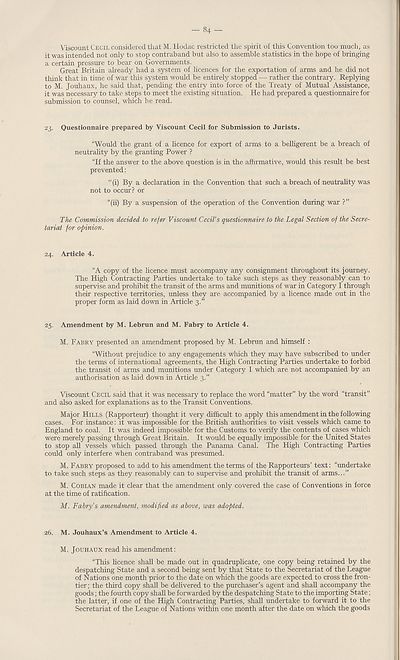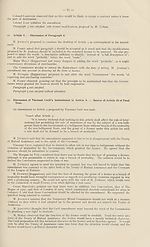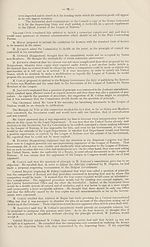Armament > Conference for the control of the international trade in arms, munitions and implements of war
(86)
Download files
Complete book:
Individual page:
Thumbnail gallery: Grid view | List view

84 -
Viscount Cecil considered that M. Hodac restricted the spirit of this Convention too much, as
it was intended not only to stop contraband but also to assemble statistics in the hope of bringing
a certain pressure to bear on Governments.
Great Britain already had a system of licences for the exportation of arms and he did not
think that in time of war this system would be entirely stopped — rather the contrary. Replying
to M. Jouhaux, he said that, pending the entry into force of the Treaty of Mutual Assistance,
it was necessary to take steps to meet the existing situation. He had prepared a questionnaire for
submission to counsel, which he read.
23. Questionnaire prepared by Viscount Cecil for Submission to Jurists.
“Would the grant of a licence for export of arms to a belligerent be a breach of
neutrality by the granting Power ?
“If the answer to the above question is in the affirmative, would this result be best
prevented:
“ (i) By a declaration in the Convention that such a breach of neutrality was
not to occur? or
“(ii) By a suspension of the operation of the Convention during war ?”
The Commission decided to refer Viscount Cecil’s questionnaire to the Legal Section of the Secre¬
tariat for opinion.
24. Article 4.
“A copy of the licence must accompany any consignment throughout its journey.
The High Contracting Parties undertake to take such steps as they reasonably can to
supervise and prohibit the transit of the arms and munitions of war in Category I through
their respective territories, unless they are accompanied by a licence made out in the
proper form as laid down in Article 3.”
25. Amendment by M. Lebrun and M. Fabry to Article 4.
M. Fabry presented an amendment proposed by M. Lebrun and himself :
“Without prejudice to any engagements which they may have subscribed to under
the terms of international agreements, the High Contracting Parties undertake to forbid
the transit of arms and munitions under Category I which are not accompanied by an
authorisation as laid down in Article 3.”
Viscount Cecil said that it was necessary to replace the word “matter” by the word “transit”
and also asked for explanations as to the Transit Conventions.
Major Hills (Rapporteur) thought it very difficult to apply this amendment in the following
cases. For instance: it was impossible for the British authorities to visit vessels which came to
England to coal. It was indeed impossible for the Customs to verify the contents of cases which
were merely passing through Great Britain. It would be equally impossible for the United States
to stop all vessels which passed through the Panama Canal. The High Contracting Parties
could only interfere when contraband was presumed.
M. Fabry proposed to add to his amendment the terms of the Rapporteurs’ text: “undertake
to take such steps as they reasonably can to supervise and prohibit the transit of arms...”
M. Gobi an made it clear that the amendment only covered the case of Conventions in force
at the time of ratification.
M. Fabry’s amendment, modified as above, was adopted.
26. M. Jouhaux’s Amendment to Article 4.
M. Jouhaux read his amendment:
“This licence shall be made out in quadruplicate, one copy being retained by the
despatching State and a second being sent by that State to the Secretariat of the League
of Nations one month prior to the date on which the goods are expected to cross the fron¬
tier ; the third copy shall be delivered to the purchaser’s agent and shall accompany the
goods; the fourth copy shall be forwarded by the despatching State to the importing State;
the latter, if one of the High Contracting Parties, shall undertake to forward it to the
Secretariat of the League of Nations within one month after the date on which the goods
Viscount Cecil considered that M. Hodac restricted the spirit of this Convention too much, as
it was intended not only to stop contraband but also to assemble statistics in the hope of bringing
a certain pressure to bear on Governments.
Great Britain already had a system of licences for the exportation of arms and he did not
think that in time of war this system would be entirely stopped — rather the contrary. Replying
to M. Jouhaux, he said that, pending the entry into force of the Treaty of Mutual Assistance,
it was necessary to take steps to meet the existing situation. He had prepared a questionnaire for
submission to counsel, which he read.
23. Questionnaire prepared by Viscount Cecil for Submission to Jurists.
“Would the grant of a licence for export of arms to a belligerent be a breach of
neutrality by the granting Power ?
“If the answer to the above question is in the affirmative, would this result be best
prevented:
“ (i) By a declaration in the Convention that such a breach of neutrality was
not to occur? or
“(ii) By a suspension of the operation of the Convention during war ?”
The Commission decided to refer Viscount Cecil’s questionnaire to the Legal Section of the Secre¬
tariat for opinion.
24. Article 4.
“A copy of the licence must accompany any consignment throughout its journey.
The High Contracting Parties undertake to take such steps as they reasonably can to
supervise and prohibit the transit of the arms and munitions of war in Category I through
their respective territories, unless they are accompanied by a licence made out in the
proper form as laid down in Article 3.”
25. Amendment by M. Lebrun and M. Fabry to Article 4.
M. Fabry presented an amendment proposed by M. Lebrun and himself :
“Without prejudice to any engagements which they may have subscribed to under
the terms of international agreements, the High Contracting Parties undertake to forbid
the transit of arms and munitions under Category I which are not accompanied by an
authorisation as laid down in Article 3.”
Viscount Cecil said that it was necessary to replace the word “matter” by the word “transit”
and also asked for explanations as to the Transit Conventions.
Major Hills (Rapporteur) thought it very difficult to apply this amendment in the following
cases. For instance: it was impossible for the British authorities to visit vessels which came to
England to coal. It was indeed impossible for the Customs to verify the contents of cases which
were merely passing through Great Britain. It would be equally impossible for the United States
to stop all vessels which passed through the Panama Canal. The High Contracting Parties
could only interfere when contraband was presumed.
M. Fabry proposed to add to his amendment the terms of the Rapporteurs’ text: “undertake
to take such steps as they reasonably can to supervise and prohibit the transit of arms...”
M. Gobi an made it clear that the amendment only covered the case of Conventions in force
at the time of ratification.
M. Fabry’s amendment, modified as above, was adopted.
26. M. Jouhaux’s Amendment to Article 4.
M. Jouhaux read his amendment:
“This licence shall be made out in quadruplicate, one copy being retained by the
despatching State and a second being sent by that State to the Secretariat of the League
of Nations one month prior to the date on which the goods are expected to cross the fron¬
tier ; the third copy shall be delivered to the purchaser’s agent and shall accompany the
goods; the fourth copy shall be forwarded by the despatching State to the importing State;
the latter, if one of the High Contracting Parties, shall undertake to forward it to the
Secretariat of the League of Nations within one month after the date on which the goods
Set display mode to:
![]() Universal Viewer |
Universal Viewer | ![]() Mirador |
Large image | Transcription
Mirador |
Large image | Transcription
Images and transcriptions on this page, including medium image downloads, may be used under the Creative Commons Attribution 4.0 International Licence unless otherwise stated. ![]()
| League of Nations > Armament > Conference for the control of the international trade in arms, munitions and implements of war > (86) |
|---|
| Permanent URL | https://digital.nls.uk/195382881 |
|---|
| Shelfmark | LN.IX |
|---|
| Description | Over 1,200 documents from the non-political organs of the League of Nations that dealt with health, disarmament, economic and financial matters for the duration of the League (1919-1945). Also online are statistical bulletins, essential facts, and an overview of the League by the first Secretary General, Sir Eric Drummond. These items are part of the Official Publications collection at the National Library of Scotland. |
|---|---|
| Additional NLS resources: |
|

